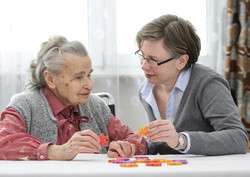Improving dementia care with patient-focused apps

EU-funded researchers have developed new apps that enable healthcare workers to provide more personalised care to dementia sufferers.
The apps, developed through the EU-funded MIRROR project, have been designed to enable workers in residential homes to be more creative and effective in delivering person-centred care. The Carer App, for example, supports a range of functions, including creating new solutions to challenging behaviours and recording good care practices.
Indeed, one interesting feature of this app is a service that allows care staff to describe a problematic situation that they are encountering and retrieve similar case studies automatically in a matter of seconds. Carers can then browse these case studies to select one or more appropriate to the situation, and then implement good practice based on the recommendations provided.
This is important as carers specialising in dementia need advice and information quickly, delivered in situ and available around the clock. The app also generates content to support cognitive creative tasks for care staff.
The project, which began in July 2010 and ended in June 2014, carried out trials of the new technology at a residential care home in the UK. The responses, some of which can be viewed on www.youtube.com/watch?v=CDC5ff … ture=em-upload_owner (YouTube), help to underline the success of the project in achieving its objectives.
Carers found that using a portable touchscreen iPod – essentially an iPhone without the phone function – enabled them to input information into the centralised system in a timely manner, and likewise receive information in real time. Furthermore, being portable meant that workers did not have to stop their care activities in order to take notes or find some documentation. This gave carers more time to spend with residents, compared to before when they had to carry around large folders.
The demonstration also found that individuals were well-versed in using touchscreen applications. As a result, there was high acceptance of the technology in the workplace.
The portable, digital application also provided carers with an extra tool to help engage and stimulate patients. The touchscreen iPod can be uploaded with a person's life history, complete with google maps, videos and digital photos. Having all these resources at hand facilitates much more spontaneous communication, helping carers and dementia patients to connect.
The MIRROR project's overall objective was to empower and engage employees across a number of sectors through capturing and sharing the experiences of others. The development of apps capable of facilitating learning in the social care sector formed an important part of the project. Another app, called CaReflect, was also developed to support care staff and reflective learning in residential care homes.
This app automatically measures the time that care staff and residents are in contact with each other. Care staff and residents each wear a sensor, like a badge. After each shift, carers can log onto the private CaReflect system to see and review their own contacts.
Through the development of these and other apps, the MIRROR project has pioneered a new technology-enhanced learning approach to challenging working situations where no teachers and no formal content are available.
More information: MIRROR project: www.mirror-project.eu/

















